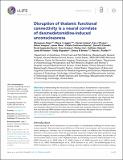Disruption of thalamic functional connectivity is a neural correlate of dexmedetomidine-induced unconsciousness
Author(s)
Akeju, Oluwaseun; Catana, Ciprian; Vazquez, Rafael; Rhee, James; Contreras Ramirez, Violeta; Izquierdo-Garcia, David; Arabasz, Grae; Hsu, Shirley; Habeeb, Kathleen; Napadow, Vitaly; Chonde, Daniel B.; Loggia, Marco L.; Hooker, Jacob M.; Purdon, Patrick Lee; Pavone, Kara J.; Brown, Emery Neal; ... Show more Show less
DownloadAkeju-2014-Disruption of thalamic.pdf (2.167Mb)
PUBLISHER_CC
Publisher with Creative Commons License
Creative Commons Attribution
Terms of use
Metadata
Show full item recordAbstract
Understanding the neural basis of consciousness is fundamental to neuroscience research. Disruptions in cortico-cortical connectivity have been suggested as a primary mechanism of unconsciousness. By using a novel combination of positron emission tomography and functional magnetic resonance imaging, we studied anesthesia-induced unconsciousness and recovery using the α[subscript 2]-agonist dexmedetomidine. During unconsciousness, cerebral metabolic rate of glucose and cerebral blood flow were preferentially decreased in the thalamus, the Default Mode Network (DMN), and the bilateral Frontoparietal Networks (FPNs). Cortico-cortical functional connectivity within the DMN and FPNs was preserved. However, DMN thalamo-cortical functional connectivity was disrupted. Recovery from this state was associated with sustained reduction in cerebral blood flow and restored DMN thalamo-cortical functional connectivity. We report that loss of thalamo-cortical functional connectivity is sufficient to produce unconsciousness.
Date issued
2014-11Department
Massachusetts Institute of Technology. Institute for Medical Engineering & Science; Martinos Imaging Center (McGovern Institute for Brain Research at MIT); Harvard University--MIT Division of Health Sciences and Technology; Massachusetts Institute of Technology. Department of Brain and Cognitive Sciences; McGovern Institute for Brain Research at MITJournal
eLife
Publisher
eLife Sciences Publications, Ltd.
Citation
Akeju, Oluwaseun, Marco L Loggia, Ciprian Catana, Kara J Pavone, Rafael Vazquez, James Rhee, Violeta Contreras Ramirez, et al. “Disruption of Thalamic Functional Connectivity Is a Neural Correlate of Dexmedetomidine-Induced Unconsciousness.” eLife 3 (November 29, 2014).
Version: Final published version
ISSN
2050-084X